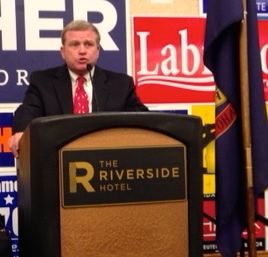
Gov. Butch Otter’s annual post-legislative presser didn’t follow the plan.
Otter obviously wanted to tout the session’s progress on education funding — as outlined in a two-page news release. Otter didn’t get everything he wanted: his request for a 7.9 percent K-12 budget increase was whittled down to 7.4 percent. But Otter softpedaled these differences and applauded legislators for funding 90 to 95 percent of his education proposals.
Maybe 90 to 95 percent is the new 100 percent — but it didn’t make for Monday’s headline.
The big story, predictably enough, was the Legislature’s inaction on the “gap population,” the 78,000 Idahoans who do not qualify for Medicaid or the state health exchange. Otter put to rest the short-lived and maybe wishful talk that he would schedule a special session to address the Medicaid gap. At one point, he deflected the talk by making a joking reference to the date of the May 17 Republican primary — before changing his tone and acknowledging the serious nature of the health care crisis.
Monday was destined to be health care day, and no messaging strategy was going to change that.
But even on education, Otter overshadowed his own message on funding.
Responding to a question on the Idaho Education Network debacle, Otter threw Attorney General Lawrence Wasden into the midst of the free-for-all.
Before state officials decided to split the broadband contract into two pieces in 2009, Otter said, a Wasden deputy signed off on the move.
Idaho’s legal problems can all be traced back to that rewrite — declared void at the district court and state Supreme Court level. With no workable contract, the state was forced to scrub the system; with no legal recourse, the state is now reduced to paying off legal fees and looking to settle with network vendors.
“We’re beyond blame,” Otter said at one point. “We’ve got a problem. We’re trying to solve the problem.”
But that was after he said Wasden’s staff had a role in this mess. Otter seemed to be trying to deflect criticism away from a longtime confidante, Mike Gwartney, who executed the ill-conceived contract rewrite during his time heading the state Department of Administration.
But Otter achieved something else. He injected himself into a growing and increasingly public rift between Wasden and other Statehouse Republicans.
These tensions went public in the waning days of the 2016 session, as Senate Majority Leader Bart Davis put the A.G.’s budget on hold, after Wasden opposed spent nuclear fuels shipments to the Idaho National Laboratory.
Lest anyone think the rift with Wasden is a one-issue thing, Otter’s news conference pretty much demonstrated the contrary.

Wasden isn’t backing off.
“At this point, neither the governor nor anybody from his office has spoken directly with the attorney general about this aspect of the IEN litigation. As a result, we’re in the unfortunate position of getting this information secondhand and through the press,” Wasden spokesman Todd Dvorak said Monday. “That being said, what’s clear right now is the conclusion and direction of the Idaho Supreme Court, which reviewed evidence, depositions, testimony and countless records in reaching its recent decision in this litigation.”
That, by the way, would be the Supreme Court opinion that said Gwartney “corrupted the procurement process.”
To a large degree, Wasden has managed to stay outside the Idaho Education Network fray. That’s because the state outsourced its legal representation in the case, at a taxpayer cost exceeding $1 million. The Idaho Education Network has been an administrative albatross stretching from Otter’s first term as governor clear into his third term, but Wasden has had cover.
On Monday, Otter went out of his way to change that.
During last week’s pundits panel on Idaho Public Television’s “Idaho Reports,” I was asked to weigh in on some of the intraparty power struggles at the Statehouse — such as the friction between legislators and Wasden. I attributed some of this to checks and balances, an adversarial system that assumes some tension between the branches of government.
But, I added, some of this is a function of longevity. Otter just completed his 10th legislative session as governor, Wasden his 14th. By and large, the Legislature’s GOP leaders have been in office a decade or more. That tends to have a cumulative effect.
As long as you have people involved in politics and public policy, you’re going to have personalities involved in politics and public policy.
On Monday, those personalities were made clear for the public to see and for the media to report. Whether Otter planned it that way or not.
